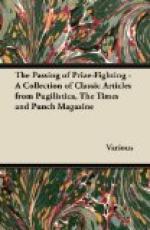Thinking of magic and Mr. Widdicomb (of whom dark hints of identification with the wandering Jew have been dropped—who, we know, taught Prince George of Denmark horsemanship—who is mentioned by Addison in the “Spectator,” by Dr. Johnson in the “Rambler,” and helped to put out each of the three fires that have happened at Astley’s during the last two centuries), brought by these considerations to a train of mind highly susceptible of supernatural agency, we visited—
THE WIZARD OF THE NORTH,
the illustrious professor of Phoenixsistography, and other branches of the black art, the names of which are as mysterious as their performance.
One only specimen of his prowess convinced us of his supernatural talents. He politely solicited the loan of a bank-note—he was not choice as to the amount or bank of issue. “It may be,” saith the play-bill, “a Bank of England or provincial note, for any sum from five pounds to one thousand.” His is better magic than Owen Glendower’s, for the note “did come when he did call it!” for a confiding individual in the boxes (dress circle of course) actually did lend him, the Wizard, a cool hundred! Conceive the power, in a metaphysical sense, the conjuror must have had over the lender’s mind! Was it animal magnetism?—was it terror raised by his extraordinary performances, that spirited the cash out of the pocket of the man? who, perhaps, thought that such supernatural talents might be otherwise employed against his very existence, thus occupying his perturbed soul with the alternative, “Your money or your life!”
This subject is deeply interesting to actors out of engagements, literary men, and people who “have seen better days”—individuals who have brought this species of conjuration to a high state of perfection. It is a new and important chapter in the “art of borrowing.” We perceive in the Wizard’s advertisements he takes pupils, and offers to make them proficient in any of his delusions at a guinea per trick. We intend to put ourselves under his instructions for the bank-note trick, the moment we can borrow one-pound-one for that purpose.
Besides this, the Wizard does a variety of things which made our hair stand on end, even while reading their description in his play-bill. We did not see him perform them. There was no occasion—the bank-note trick convinced us—for the man who can borrow a hundred pounds whenever he wants it can do anything.
Everybody ought to go and see him. Young ladies having a taste for sentimental-looking men, who wear their hair a la jeune France; natural historians who want to see guinea-pigs fly; gamesters who would like to be made “fly” to a card trick or two; connoisseurs, who wish to see how plum-pudding may be made in hats, will all be gratified by a visit to the Adelphi.
* * * * *




